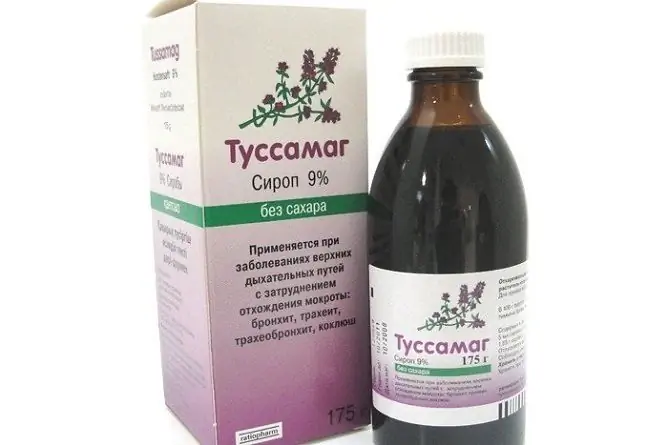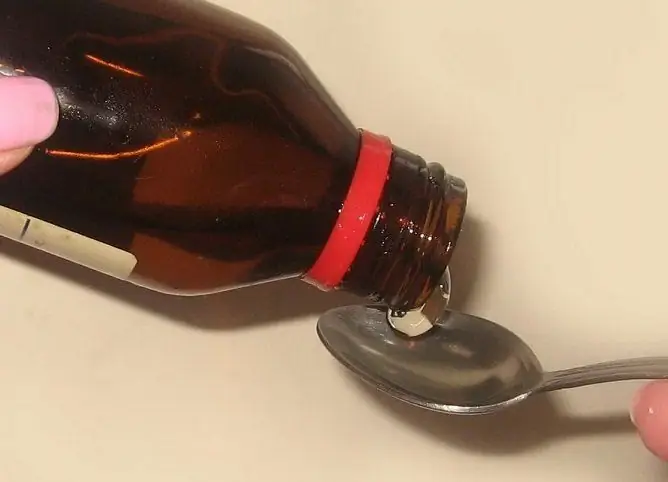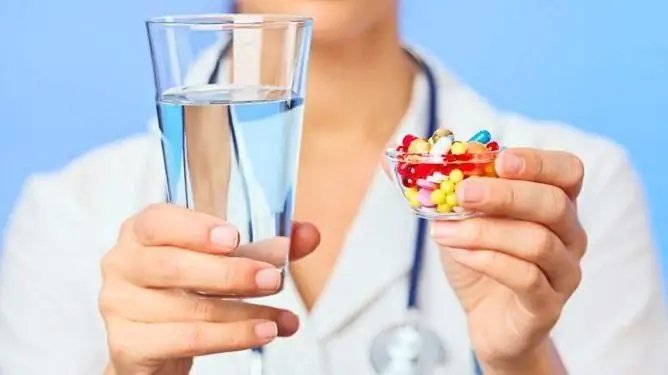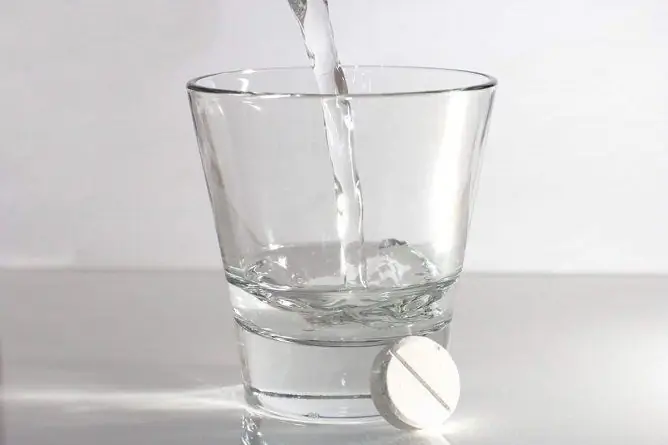- Author Rachel Wainwright wainwright@abchealthonline.com.
- Public 2023-12-15 07:39.
- Last modified 2025-11-02 20:14.
Dry and wet cough syrups for children
The content of the article:
- How to choose the right syrup
- Dry cough syrups for children
- Wet cough syrups for children
- Video
When choosing a cough syrup for children, parents should be guided by the following criteria: from which components the drug is produced (preferably drugs from natural ingredients), is the child allergic to the constituent drugs and whether he has taken it before, reviews on the treatment of a specific age group, and also on the frequency of administration and the group of the drug (some of them only thin the phlegm, others help to cough it up). It is also imperative to consider what type of cough the child has, whether he needs syrup or should he turn to other dosage forms. You should not prescribe the medicine yourself - it is better to consult a pediatrician before doing this.

When prescribing a cough syrup, the type of cough and disease, as well as the age of the child, are taken into account
How to choose the right syrup
The first thing that parents should be convinced of before giving syrup to a child is whether he really needs such treatment. If the child has a disease of the upper respiratory tract, and the bronchi are not included in the pathological process (sore throat, reflex cough, phlegm does not come out), there may be a need for sprays or other medications, but not for antitussive syrups.
Which drug to choose? Syrups are classified according to several criteria. First, they are divided into semi-synthetic, synthetic and natural. Obviously, given the potential side effects, it is advisable to choose herbal preparations whenever possible. Semi-synthetics also have medicinal herbs in their composition. However, synthetic drugs are usually the most effective.
All drugs for the treatment of cough are divided into the following groups:
- antitussive - these agents act symptomatically, removing unpleasant manifestations of cough, but not eliminating the cause. They affect irritated mucous membranes or the cough center, oppressing it. They are used for prolonged, exhausting dry, unproductive cough;
- mucolytics - acting on the chemical structure of sputum, they make it less viscous, create conditions for easy expectoration of liquefied mucus. Reception of such funds is recommended if the cough is productive, but the mucus leaves poorly, wheezing is heard;
- expectorants - increase the activity of the villi of the bronchial epithelium, which push out mucus and dust that has not settled on it, as well as microbial particles immobilized by some chemical components of sputum. Appointed when the mucus is already quite liquid, but slowly departs, with a protracted illness;
- combined - include elements of all three pharmacological groups.
To eliminate the cause of the cough, it is important to consider whether the child's cough is dry (unproductive) or wet (wet, productive).
Dry cough syrups for children
It is important to consider the age of the child when choosing a medication. For different age groups, drugs differ in dosage, active ingredient and frequency of administration.
Children under 1 year old are prescribed:
- Bromhexine - the advantage is that the product is mono-component (one active ingredient), therefore it has a low allergic activity. The drug has a wide spectrum of action, enhances the secretion of mucus, dilutes it, that is, it has mucolytic properties. It can be given to children of any age. There are contraindications: it is not prescribed for inflammatory diseases of the stomach and duodenum, bronchial asthma or allergic lesions of the upper respiratory tract, violation of the integrity of the mucous membrane. You can not use the drug together with funds aimed at combating wet cough, as well as in the presence of a large amount of wet and liquid sputum. Reception according to the instructions, unless otherwise indicated by the doctor - 3 times a day, 5 ml of syrup (5 ml is equivalent to a teaspoon).
- Prospan is a good syrup based on ivy leaf extract. It has an antitussive, expectorant effect, and also has an antibacterial effect. Since the drug is herbal, side effects are usually not observed. It is indicated both in the treatment of acute inflammation of the bronchi and in chronic diseases of the respiratory system. It is not recommended to use it simultaneously with codeine-containing drugs, however, they are generally contraindicated in this age group. Due to the absence of synthetic components, it can be used simultaneously with antibiotics. It is taken in the morning and in the evening, for children under one year old, the dose is 2.5 ml (half a teaspoon).

Prospan is a plant-based cough medicine that can be used in the smallest
Suitable for children from 1 to 2 years:
- Tussamag - the drug has an anti-inflammatory, expectorant effect. This is a herbal cough syrup for children, based on liquid thyme extract and supplemented with synthetic ingredients. Not applicable in case of heart failure. Sometimes (in 9% of cases) it can cause an allergic reaction. Shake the syrup before use. Frequency rate and dose for children from 1 year old: 3 times a day, a teaspoon.
- Gedelix - also based on a thick ivy extract, but does not contain ethanol and sugar, and is not prescribed for patients with fructose intolerance. It is a completely herbal remedy. Apply 3 times a day, 2.5 ml with plenty of water. This will help the transition from dry to wet cough.
A child from 2 to 3 years old is assigned:
- Herbion plantain syrup - contains plantain extract and ascorbic acid, harmless to children, rarely causes side effects. It is used exclusively for dry cough. Contains sucrose. Children should be given 1 scoop three times a day. Contraindicated in renal failure, diabetes mellitus, stomach ulcer.
- Glycodin - contains several active substances that inhibit the cough center, while, without affecting the respiratory center, produces a direct antitussive effect. Contains chemical compounds that enhance the secretory capacity of the glands. The latter feature is important in combating dry cough. 30 minutes after ingestion, the effect of the drug begins, which lasts up to 6 hours. Do not use with wet cough medicines. For children of this age, it is better to take a quarter of a complete measuring spoon three times a day.
In children 3 years of age and older, dry cough is treated with the following remedies:
- Dr. Mom - contains a whole list of medicinal herbs, ranging from basil and turmeric, ending with aloe and ginger, in addition to them contains menthol, which reflexively expands the lumen of the bronchi. Has anti-inflammatory, analgesic, expectorant effect. The drug is completely herbal, but has a long list of contraindications, including asthma, diarrhea, renal failure, bowel obstruction. It is taken 2.5 ml three times a day after meals.
- Sinekod - the active ingredient is butamirate, which inhibits the cough center, while being a non-narcotic agent. Cannot be used simultaneously with expectorant drugs. Completely excreted from the body in 48 hours. Take 5 ml 3 times a day. May cause drowsiness.
- Bronholitin - contains glaucine and ephedrine, which act on the bronchi, expanding the lumen, increasing the secretory activity of the glandular epithelium. Can be used simultaneously with antibiotics, antipyretic and anti-inflammatory drugs. Effectively relieves cough before and after attacks of bronchial asthma thanks to ephedrine. It has a stimulating effect on the central nervous system, so it can cause anxiety in children, sleep disturbances, and excessive physical activity. Take 5 ml, previously diluted in 10 ml of cool boiled water, three times a day.
Wet cough syrups for children
For the treatment of wet cough in children under one year old are used:
- Prospan - described above in the section "From dry cough", while it can also be used for wet coughs, because it is able to enhance sputum discharge, has a low allergenicity and a simple but effective composition. At the same time, it does not contain sugar, practically has no contraindications. The first few times it is better to take it under the supervision of a pediatrician to rule out an allergic reaction.
- Ambrobene is a drug based on ambroxol. A classic mucolytic, it has the ability to reduce the viscosity of mucus, increase its separation, and enhance the work of epithelial villi. Retains antibiotics in the mucus of the bronchi, which increases their therapeutic effect - the parallel use of Ambroxol and antibiotics, especially Doxycycline, is recommended. In the presence of inflammatory skin reactions, the intake should be discontinued. Treatment is carried out in doses of 1 ml 3 times a day.
- Lazolvan - Ambroxol is also an active ingredient. The product should be taken 2.5 ml twice a day. There are excellent reviews about this cough syrup for children, which confirms its high effectiveness.

Syrup Dr. Mom is suitable for patients of all ages
Suitable for children from one to two years:
- Herbion primrose syrup - based on extracts of primrose root and thyme herb. A pronounced mucolytic, expectorant, anti-inflammatory effect makes the drug very popular. Contraindicated in inflammatory diseases of the kidneys and gastrointestinal tract. Take 1 scoop 3 times a day.
- Dr. Theiss - Plantain-based herbal preparation contains glycosides, saponins, flavonoids. It is not prescribed in the presence of hypersensitivity to one of the components of the drug. Cannot be used together with antitussives. Take 2.5 ml 5-7 times a day, with intervals of 2-3 hours.
- Linkas is a herbal preparation, in which the leading role is played by licorice and adhatoda root. Has a wide spectrum of action (expectorant, mucolytic, anti-inflammatory, antipyretic). The drug reduces swelling of the alveoli and bronchial mucosa. Contraindicated in organic heart damage. Take 5 ml of syrup 3 times a day.
For a child aged 2 years and older, the following are recommended:
- Fluditec - contains carbocisteine. Mucolytic, breaks the chemical bonds inside the mucus, making it liquid and easily excreted. Not applicable until 2 years of age, as well as for stomach ulcers. Dosing takes place using a glass, take 5 ml of syrup 2 times a day.
- Pertussin - contains thyme extract. Stimulates mucociliary clearance, enhances the work of villi on the epithelium. It is not used for cardiac decompensation, decreased blood pressure, allergies. Reception is carried out according to the scheme: dilute 2.5 ml of syrup in 20 ml of cool boiled water, take three times a day.
Video
We offer for viewing a video on the topic of the article.

Nikita Gaidukov About the author
Education: 4th year student of the Faculty of Medicine No. 1, specializing in General Medicine, Vinnitsa National Medical University. N. I. Pirogov.
Work experience: Nurse of the cardiology department of the Tyachiv Regional Hospital No. 1, geneticist / molecular biologist in the Polymerase Chain Reaction Laboratory at VNMU named after N. I. Pirogov.
Found a mistake in the text? Select it and press Ctrl + Enter.






